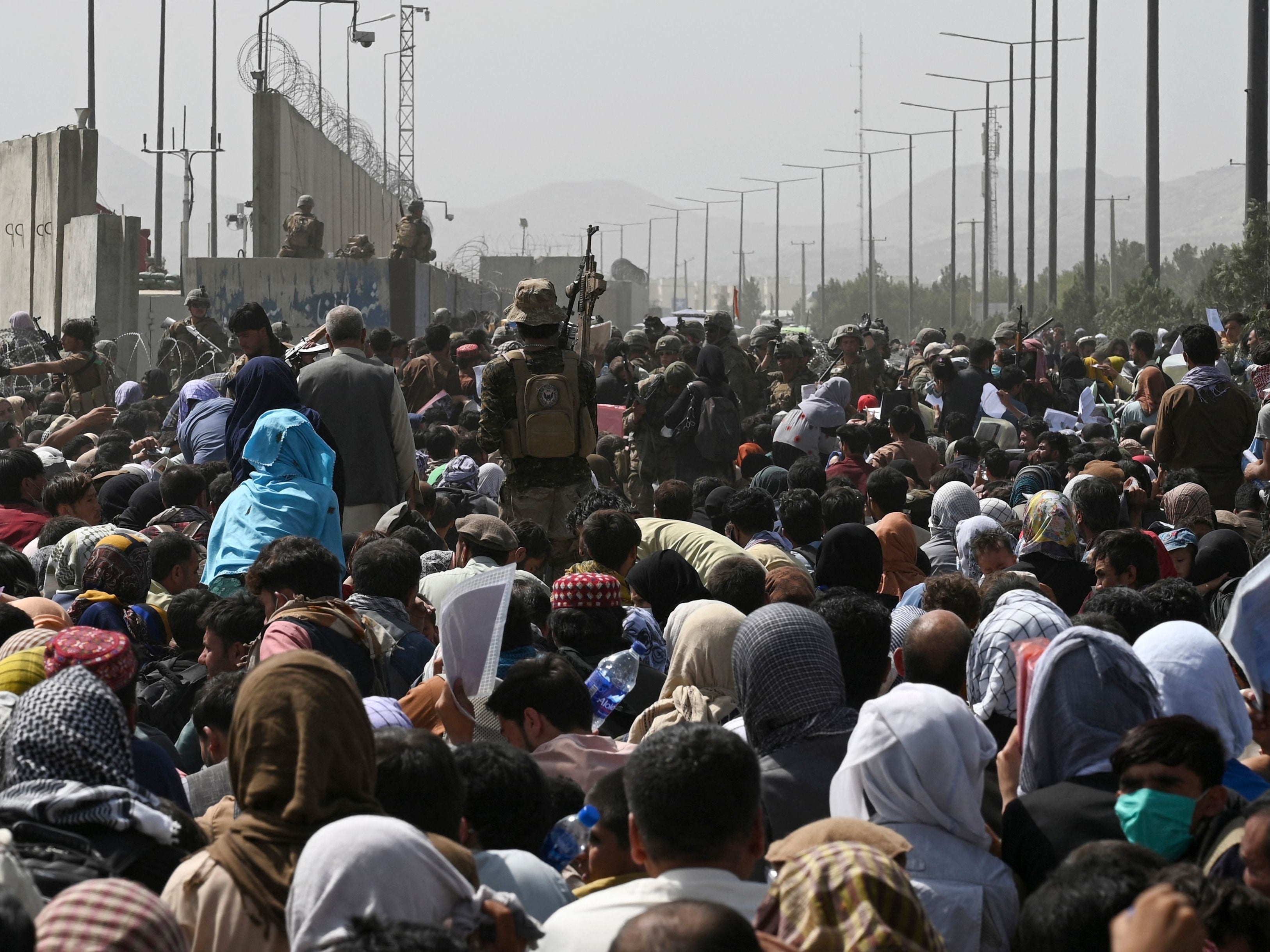Resist, accommodate or flee: The tough choice for Afghans over the Taliban
The question is how much the people are willing to challenge, question, push, cajole and negotiate with the country's new leaders, writes Borzou Daragahi


The Afghan aid official and his family tried to make it to Kabul airport. They wanted desperately to get out of the country. But they were daunted by the massive, desperate crowds outside and the presence of unruly soldiers protecting the facility.
The 52-year-old, who mostly lives in the Gulf, opted to keep himself and his family at their home in Kabul, at least for now. But instead of cowering in fear, he called relatives and members of his extended family who are in touch with “the other side,” as he describes the Taliban.
He implored them to vouch for him and his family, and to win assurances that the militant fundamentalists now in control of Afghanistan would not harm him. They sent out feelers on his behalf: as an executive running an aid organisation distributing help to the neediest in remote places like Khost, Kunduz and Baghlan, he would contribute to the country’s success rather than its failure.
He has since been out and about, driving around the capital’s streets in his Toyota Corolla and taking strolls through marketplaces that are beginning to reopen.
“I think I should be okay,” he says in a phone interview, requesting that his name and that of his organisation are not published. “We are one people, after all.”
With the Taliban now in control in Afghanistan, thousands of negotiations like this are unfolding every day, with ordinary Afghans struggling either to resist or to accommodate their new masters in order to pursue their own lives and ambitions.
For example, even as Afghanistan’s American-backed president, Ashraf Ghani, fled the country to the UAE, his predecessor, Hamid Karzai, and their arch political rival, Abdullah Abdullah, stood next to each other in Kabul and announced that they would be staying put and trying to maintain the peace.
Protests against the Taliban have erupted in a number of cities – brave outbursts of defiance that the group seems confused about how to handle. Meanwhile, the son of the late warlord Ahmad Shah Massoud has vowed to rally armed resistance against the group, from the Panjshir Valley north of Kabul.
Walid Tamim, a former deputy finance minister now living abroad, also predicts that the Taliban’s effort to consolidate power will not be nearly as easy as it was back in 1996. Back then, the country was reeling from years of civil war, and its economy was ravaged. The Taliban’s emergence and arrival was almost a relief.
But the Taliban now takes over from a system that was built up over nearly 20 years, which – despite its many flaws and drawbacks – has provided a measure of stability and rights to the Afghan people.
“When they took over before, the people didn’t need food, civil rights, jobs; they just needed peace and the Taliban were able to provide a sense of security,” he says in a phone interview. “The economy was already shattered, and the people were going through a horrible life. So, from nothing to nothing was OK.”
But Afghan people now have higher expectations. Women’s status has advanced, especially in the cities, where classrooms in institutions of higher learning are filled with women. Long-oppressed religious minorities, such as the Shia Hazara, have gained social and economic status. People have become accustomed to a certain measure of political rights.
Even if it manages to suppress street protests, the Taliban will be faced with demands from civil service employees, soldiers and pensioners for their pay, even as the International Monetary Fund, Western Union and other global financial institutions cut the Taliban off.
“They were trained to destabilise the government system, and they have been practicing to demolish a system, but they are not familiar with operating a system of governance to provide services and financial stability to satisfy people’s demands,” says Tamim.
Some predict that this will force the Taliban to compromise with their predecessors, such as Karzai and Abdullah, and to bow to some of the demands of both the international community and the burgeoning Afghan bourgeoisie. But others aren’t so sure. Taqi Musharraf helped run a girls’ dance school in Kabul until he was hounded out of the country after receiving threatening calls from the Taliban on 12 July.
“They wanted me to leave Kabul and meet with them,” he says during a meeting in Istanbul. “They said if you don’t come, we know all your addresses and your relatives’ addresses.”
He says he believes the Taliban has been planning for this moment for years, and has no intention of compromising with anyone, and that its forces are already too powerful to resist. “There is no such thing as Afghanistan any more for me,” he says. “I don’t see anything to fight for.”
Even optimists note that many of the behaviours of the current Taliban resemble those of the group that imposed a harsh, violently punitive version of Islam on the nation during the 1990s.
“They don’t look different,” says Tamim. “They have the same clothes, same beards, they are armed without name-tags, and they play their music very loud. You don’t see a change of behaviour. They remain in their old framework. They have this old mentality and the same behaviour.”
For now and the foreseeable future, the question in Afghanistan is how much the Afghan people are willing to challenge, question, push, cajole and negotiate with the Taliban, and whether the group will see any advantage in showing a measure of tolerance.
Join our commenting forum
Join thought-provoking conversations, follow other Independent readers and see their replies
Comments
Bookmark popover
Removed from bookmarks